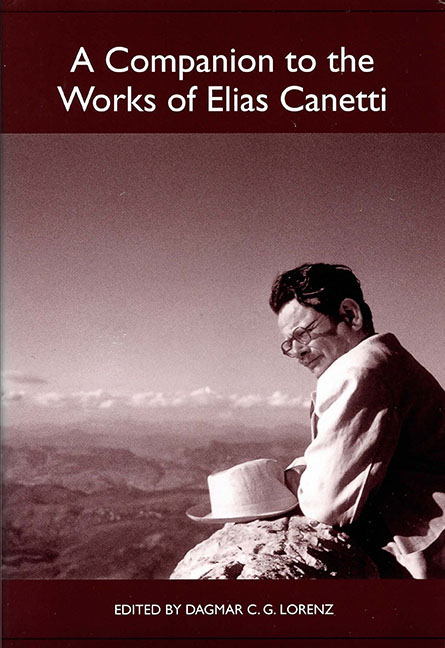Book contents
- Frontmatter
- Dedication
- Contents
- Canetti's Principal Works
- Abbreviations of Works Frequently Cited
- Introduction
- Canetti's Global Significance
- Writing and Language
- The Works: Themes and Genres
- “The Faultiest Expressions Have the Greatest Attraction”: Elias Canetti's Proverbial Aphorisms
- Canetti's Aufzeichnungen
- Staging a Critique of Modernism: Elias Canetti's Plays
- “Gute Reisende sind herzlos”: Canetti in Marrakesh
- Space in Elias Canetti's Autobiographical Trilogy
- Philosophy and Social Thought
- Historical Contexts
- Works Cited
- Notes on the Contributors
- Index
Space in Elias Canetti's Autobiographical Trilogy
from The Works: Themes and Genres
Published online by Cambridge University Press: 28 April 2017
- Frontmatter
- Dedication
- Contents
- Canetti's Principal Works
- Abbreviations of Works Frequently Cited
- Introduction
- Canetti's Global Significance
- Writing and Language
- The Works: Themes and Genres
- “The Faultiest Expressions Have the Greatest Attraction”: Elias Canetti's Proverbial Aphorisms
- Canetti's Aufzeichnungen
- Staging a Critique of Modernism: Elias Canetti's Plays
- “Gute Reisende sind herzlos”: Canetti in Marrakesh
- Space in Elias Canetti's Autobiographical Trilogy
- Philosophy and Social Thought
- Historical Contexts
- Works Cited
- Notes on the Contributors
- Index
Summary
InDie gerettete Zunge: Geschichte einer Jugend, the first volume of his autobiographical trilogy, Elias Canetti recounts a game his father played with his younger brother Georg in the nursery of their house in Manchester, England. Father and son would alternately state the house number, street, district, city, and country of their residence, and Elias always concluded their game by chiming in “Europe” (GZ, 61). This geographical game burns in Canetti's memory because it was the last exchange he shared with his father. Young Elias's exclamation “Europe” is multivalent. Completing the address gave him a sense of wholeness (GZ, 61). The exclamation evinces the boy's delight in learning and showing off his knowledge. It is linked to his extended family's notion that the Danube port city of Roustchouk was not Europe but rather part of the Orient. It may be interpreted as a sign of Canetti's nascent cosmopolitanism. Canetti's recollection of this game certainly demonstrates the centrality of geographic space in his life from an early age. The significance of geographic space is palpable in other boyhood interests — Elias's collection of stamps from various countries and his jigsaw puzzle map of Europe, which he could put together while blindfolded, identifying the countries by feeling their shape.
Critics have often noted that Canetti's teleological organizing principle for the stuff of his autobiography is the selection of those experiences of the world, especially of places, events, people, conversations, and readings, that shaped the autobiographical subject into the author of the earlier works: the novel Die Blendung, the drama Hochzeit, and, above all, the massive anthropological study Masse und Macht. Although scholars clearly understand that Canetti experiences the world concretely, rather than theoretically or systematically, it has been only briefly noted that he frames these experiences of the world in terms of spatial relations. Gerald Stieg, for example, in his early study of the autobiography based on the first two volumes published, maintains that space plays an extraordinary role and that the relationship between the terms Weite and Enge in Canetti's work deserves a study in itself, and Gerhard Melzer incisively treats the central importance of orders of intellectual magnitude in the trilogy. This essay focuses on the predominant types of space Canetti deploys to narrate the story of his psychic and intellectual formation.
- Type
- Chapter
- Information
- A Companion to the Works of Elias Canetti , pp. 175 - 198Publisher: Boydell & BrewerPrint publication year: 2004

